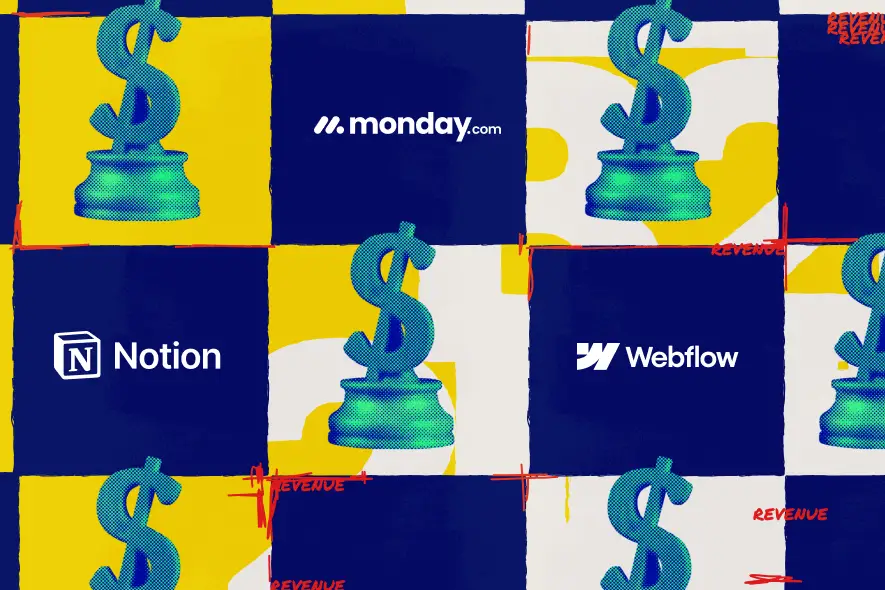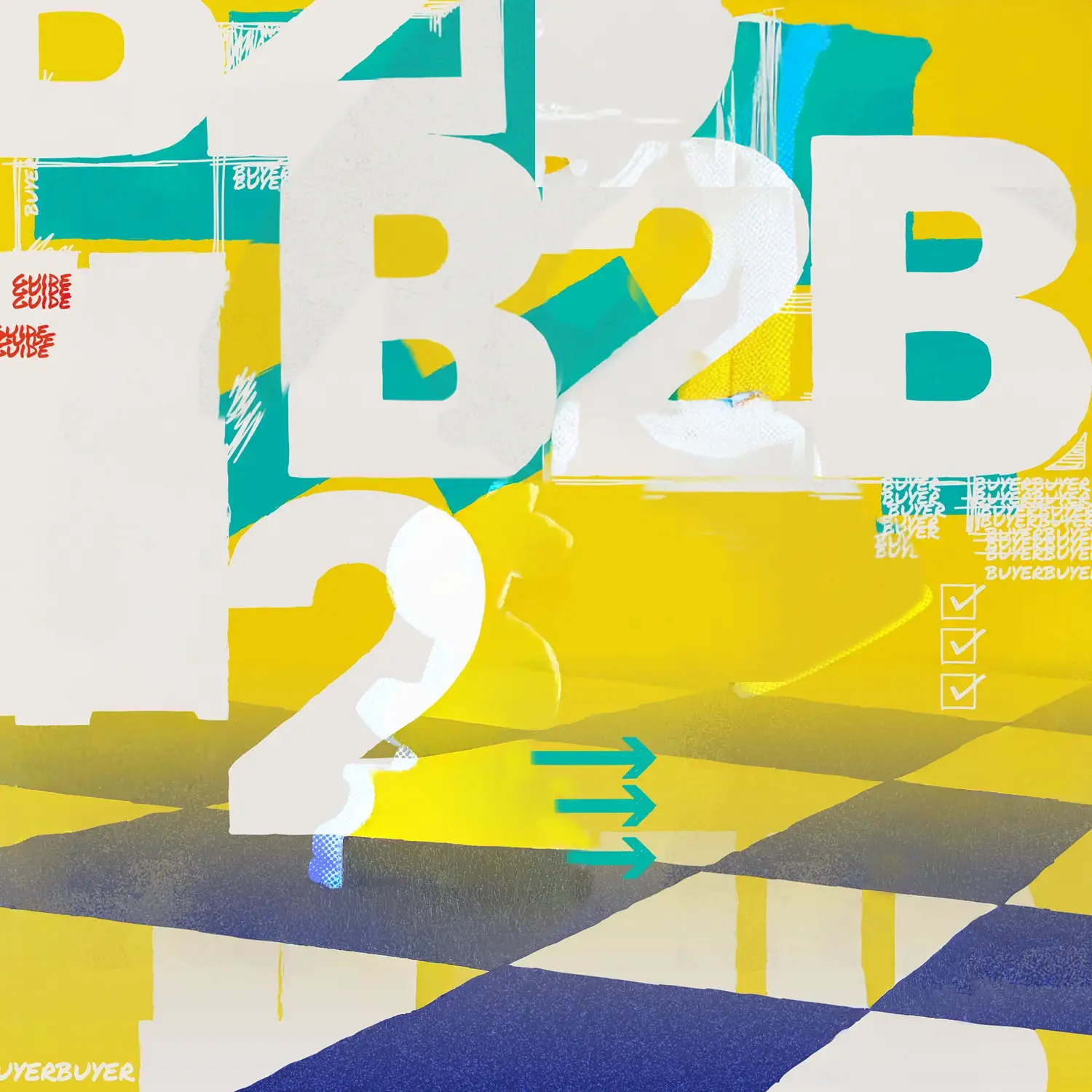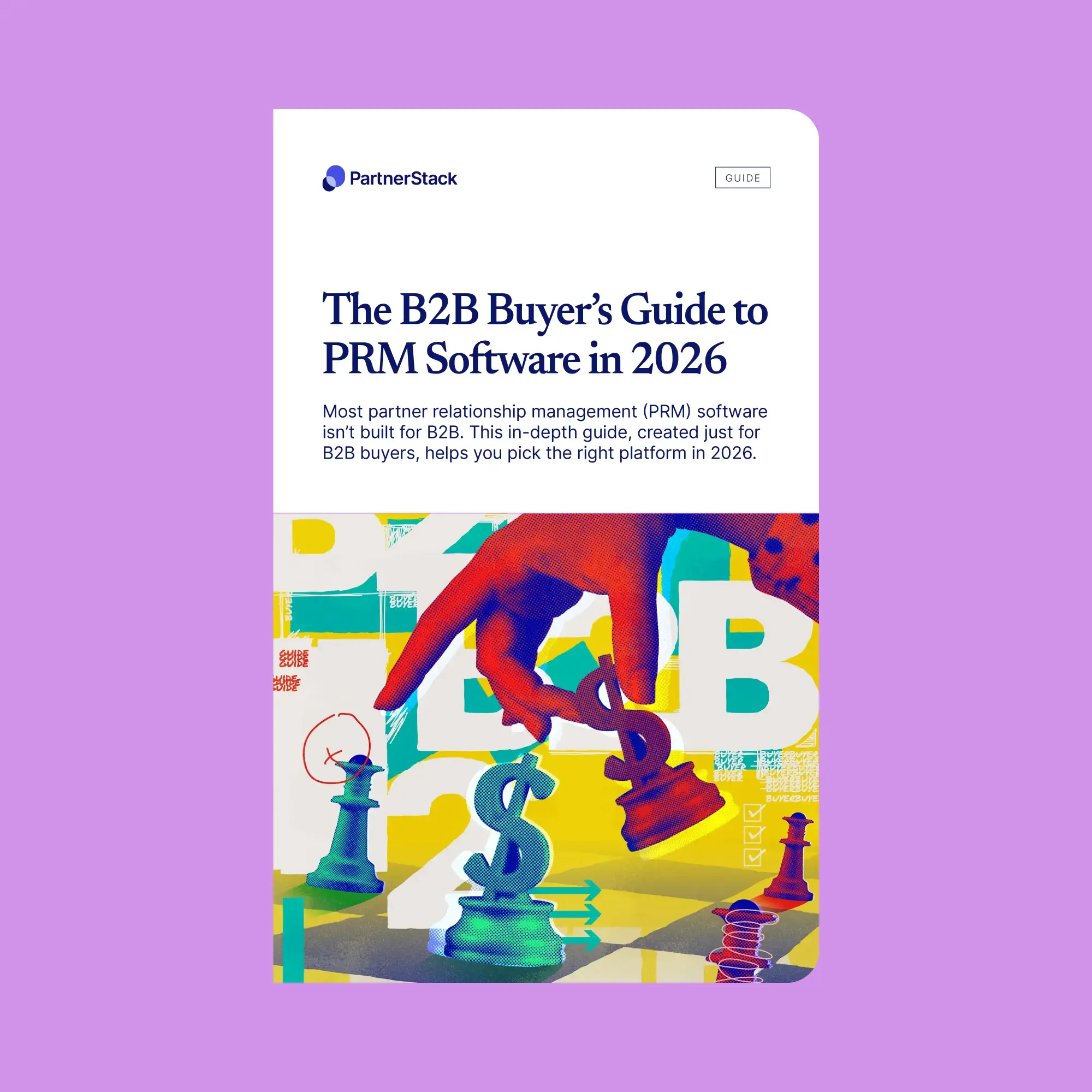About the B2B Buyer’s Guide
In 2026, every B2B professional has their eye on the revenue target. But the clearest path to growth? It’s indirect.
The key to unlocking efficient revenue growth through indirect lies in creating a high-impact partnerships program, driven by the best partners and the most effective PRM software on the market today.
This guide has the latest data from reports from G2, TrustRadius and Wynter, along with proprietary data from PartnerStack, to best support go-to-market pros within our ecosystem and beyond.
First things first: What’s PRM SOFTWARE?
We recognize that partner professionals have matured, so a modern PRM must serve a wide array of partner types — such as reseller, affiliate, referral, technology, alliance, influencer and service partners — and that those partner types have unique needs. This guide will address how to choose a PRM that will prioritize many different partner types simultaneously to drive value through co-selling, co-marketing and co-innovation.
Unlike customer relationship management (CRM) software, a PRM is specifically set up to handle partnerships. That means its features are geared toward recruiting, onboarding and supporting partners, rather than tracking leads or managing customer data.
To set B2B buyers up for success, we've rounded up the key numbers you need to know and are here to help guide you to revenue success. Get ready, because from here, guide author Elizabeth Melton will take on you on a buyer's journey that will address every pain point program managers and revenue leaders contend with (plus anticipate some of the needs that they might not have even thought of) — all with facts and stats for you to take back to your next revenue meeting.
Buckle up and enjoy the ride.

Behind the data
It’s an exciting time in SaaS partnerships as many teams are finally getting the credit they deserve.
But with that credit comes immense pressure to continue delivering at the fast clip leadership expects. And without a robust partnerships platform to help you and your partners stay focused, that train can easily (and quickly) fall off the tracks.
To make the evaluation process a little less daunting, we’ve compiled a set of decision-making criteria for you, based on:
Below, we walk through each factor to consider when researching potential partnerships platforms, ensuring you select a solution that:
- Gets your program launched faster
- Helps you acquire and retain more partners
- Saves time and money with automation
- Scales your program to multiple channels for more revenue
We’ll do this all while covering some of the commonly overlooked factors in building a successful SaaS partner program, like tapping into the most powerful partner network in B2B SaaS.
Before we can do that, though, we need to explain what makes B2B partner programs in SaaS different — and why not all partnership software is built to handle B2B.
Why you need partners in B2B SaaS
There are two questions on repeat in every CRO’s head:
- How can we use marketing to generate more leads for our sales team?
- How can we get our sales team to close more of those deals?
Here’s the problem with this approach: most of your potential customers will decide what to buy before they ever talk to you. As soon as the seed for a new tool is planted, buyers start putting together their shortlists — and those shortlists are short.
The TrustRadius B2B Buying Disconnect report revealed that on average, buyers’ shortlists have just two to three products on them. And 89% of enterprise buyers reported selecting products they’d heard of before even starting the research process.
So, how do you end up on those lists? Hint: it’s not cold outreach.
It’s good old word of mouth
According to Wynter’s B2B SaaS Buyer Journey Report, 72% of B2B marketing execs start their shortlists with recommendations from their peers — not from sales and marketing teams. Even amid the rise of AI, 76% of CMOs surveyed by Wynter said they prefer getting advice from real people over answer engines while building their shortlists.

Why? Because colleagues and industry experts are going to give it to you straight, telling you exactly which products or services are worth exploring. If your company doesn’t come up in those conversations, chances of a sale are slim to none.
Thankfully, this isn’t out of your control. With a partner program, you can work directly with those trusted third-party sources to market and sell your product, reach customers during the critical research phase and build integrations to connect your software to products your customers already know and love — all to build major new revenue channels for your company.But to build a SaaS partner program that scales, you need the right strategy and the right tools (aka a PRM). This guide covers both.
The unique needs of B2B partnerships
Partner programs can drive customer acquisition and revenue through many types of partners, including:
- Affiliates that drive traffic and awareness
- Influencers that drive traffic back to you or create content that builds trust
- Referral partners that are often customers who advocate for you
- Co-sell partners that introduce their customers to your product
Depending on the types of partners you work with, partnerships can support customer acquisition, retention and revenue across every stage of the SaaS funnel. But they can only do so if your PRM software can support all partner types in your program.
Unfortunately, most PRM software is only built to handle one or two partner types. Worse, they require months-long implementations, put the onus on you to recruit qualified partners, make it tough to manage payouts and lack the engagement features you need to keep your partners in the know.
Getting PRM software up and running
Whether you’re looking to launch a new partner program or upgrade the programs you run today, you need a platform that can get you operational — fast.
A number of factors influence how long it takes to migrate or launch a program. And the more prepared you are to address each factor, the faster you can get your program live on your new partnerships platform of choice.
Factors that affect time to launch of new PRM software
Strategic factors:
- Executive buy-in and alignment
- Clear goals for partner program
- Partner recruitment planning
- Partner onboarding resources
- Dedicated partner manager
Technology factors:
- Time and ease of software setup
- Data migration from current platform
- Integrating into existing tech stack
- Scaling partner program
- Dedicated partner ops resources
While partnerships will likely have many stakeholders within your team, having at least one person dedicated to managing the program and one person dedicated to the behind-the-scenes work of getting your PRM in tip-top shape will help you avoid bottlenecks that could delay your launch.

The importance of support
While PRM functionality is important, it’s not the only thing to consider. You want to know that the PRM vendor you choose has ample onboarding resources and a talented support team. In fact, the relationship you have with the team behind the platform you choose may have the most impact on your ROI. The best customer success managers help you:
- Implement your PRM the right way
- Minimize hiccups during launch
- Take advantage of and optimize the platform’s functionality and capabilities
- Provide on-demand assistance in a timely manner
- Share insights and best practices they’re seeing across their customer base

Quality of support
PartnerStack has a 94% rating for quality of support. Unsurprisingly, new programs typically go live on PartnerStack in a mere 55 days (though the average among G2 reviewers is just one month).

Most implementable
Recruiting the right partners
All too often, the number of partners in a company’s program becomes a vanity metric. It doesn’t really mean much unless the partners are actually qualified.
Partners that don’t target a similar audience, don’t have the sales and technical chops to sell your product or service, and don’t complement your GTM strategy simply aren’t going to generate sustainable revenue — no matter how much training, marketing assets or incentives you give them.
The challenge is recruiting those diamonds. It takes ample research, lots of cold outreach and several meetings to find and vet the exact right partners. What would make this process a whole lot easier, faster and more accurate is a list of potential partners to choose from, with a recommendation engine that serves up best fits based on your ideal partner profile. And therein lies the problem — few PRMs have any such built-in tools.
So add a B2B partner network to your assessment criteria. If the platform isn’t going to help you recruit more of the right partners, it’s likely not the one for you.


Recruiting through a partner network
Partner networks give partners the opportunity to showcase their value to other partners and vendors, request to join new partner programs and vet potential partners for their own program — all from a single tool.
In theory, partner networks are a great way to spread the word about your program and beef up your partner roster.
But most partner networks are — you guessed it — built for B2C eCommerce programs. That means they only attract affiliate partners that want to market those types of products. And that means they probably won’t be relevant or valuable to you if you’re running a partner program for a B2B SaaS product.

What makes PartnerStack’s Network unique?
PartnerStack has the world’s largest B2B partnerships network, with more than 100,000 active partners, all looking to form strong, mutually beneficial partnerships with the best and brightest of B2B SaaS.
The partner discovery tool helps you identify the partners that fit your ideal partner profile in a few clicks, getting you connected with partners who have:
- Significant customer overlap
- Industry and geo synergy
- Solid better-together stories
- A healthy pipeline
Plus the PartnerStack ratings to prove all of the above, accelerating your partner recruitment and conversion with low risk. The tool also has an AI matches feature that uses an AI continuous learning model to surface the most relevant partners for your program on a weekly basis.
The proof is in the data. On average, marketplace vendors see a 64% lift in partner-sourced revenue from the Marketplace. Partners see tremendous gains as well: those who are part of at least one Marketplace program typically see a 192% increase in commissions.

Automating partner payments
If you’re not prepared for it, partner payouts can become the single most frustrating and time-consuming part of managing a partner program. Without an automated payments process, partner managers (and their colleagues) end up spending dozens of hours a month:
- Answering “How much have I earned so far?” questions from partners
- Answering “What is this for again?” questions from the finance team
- Reviewing commission structures outlined in each partner’s agreement
- Cross-referencing spreadsheets for accuracy
- Calculating payments
- Initiating payouts
Manual payment processes also introduce more opportunities for error — and inaccurate and delayed payments end up costing your business even more time and money. Even worse, they erode trust with your partners. That’s why, ideally, your partnerships platform should automate the end-to-end payments process in order to:
- Let you build flexible offers for partners
- Enable other team members (like your controller) to review payouts at any point in time
- Automatically determine when partners earn commissions and how they’ll be showing partners how much they’ve earned
- Allow partners to withdraw their commissions at their convenience

Get free ecosystem advice
With PartnerStack, you can build offers that generate commissions once partners complete desired actions, like selling a subscription to your product or upgrading their referred customers to a more premium plan.
Unless you want to process payouts manually, there’s nothing else you need to do when partners hit the offer conditions you set — they can withdraw commissions whenever they’re ready.
And because they have to log into your portal to do so, there’s a high chance they’ll see the new offers, content and training you’ve posted since they last logged in, which can prompt further engagement and portal adoption.
Building partner commission offers
Providing compelling commission offers is a crucial part of recruiting the right partners and keeping them engaged. PartnerStack simplifies the process by breaking offers down into three parts:
- Know what they’re doing
- Have a trusting, captive audience
- Can get active fairly quickly
When an Event occurs that meets an offer’s Rules, a specific Action will happen. Here’s a handy breakdown to show how this framework comes to life:

What the partner is being paid for, such as:
- A new customer registration. This could be a free or paid customer, depending on your product
- A transaction with measurable value, like a new sale

Specific criteria that trigger an offer, such as:
- The value of the transaction
- The duration of the customer’s subscription
- The specific product or add-on being sold
- Bonuses for passing

PartnerStack generates a commission based on offer type and approval structure. The offer type could be:
- A flat rate, e.g. $15 per customer signup
- A percentage of the transaction value, e.g. 20% of the subscription revenue
How do you approve commissions
The approval structure could be:
- Manual: partners can only withdraw their commission after you approve it by hand
- Time delayed: partners can withdraw their commission a certain period of time after offer conditions are met (for example, 14 days)
Examples of automated partner offers
If you’re struggling to dream up the perfect offer, these examples might spark some ideas. Here are the most common ones we see our SaaS customers using in PartnerStack.
Where does the data come from?
PartnerStack connects directly to CRMs like Salesforce, HubSpot and Pipedrive to track customer and transaction data across a customer's lifetime. But CRMs aren’t the only system you can plug into. PartnerStack’s API makes it possible to sync data with any data source you want, including your own product.
Prioritizing the partner experience
A great partnerships platform doesn’t just make it easier for you to do your job. It makes partners’ jobs easier, too, giving them the resources, attractive commissions and encouragement they need to produce consistent revenue.
And the way it provides that seamless experience is through a built-in partner portal. Partner portals give partners their own tailored interface to sign into, pointing them directly to:
- New and exciting campaigns and offers
- Bonus opportunities
- Marketing assets
- Training courses
- Referral links
- Deal registration
- Performance reporting
The partner portal checklist
Use these questions to drive your PRM evaluation and ensure you’re selecting a platform truly designed with you and your partners in mind:
- Is the interface appealing and easy to use (for you and your partners)?
- Can partners message you directly from the portal?
- Do partners have their own dedicated dashboard and reporting tools to show their progress?
- Can partners withdraw their own payments?
- Is it easy to adjust the program application form?
- Can you segment partners and customize their experience?
- Can you promote special offers and commissions to partners?

What do you like best about PartnerStack?
G2 Usability Index
PartnerStack is so intuitive to program managers and partners that it earned both “Easiest to Use” and “Best Usability” badges from G2, with the highest satisfaction ratings in the PRM category.

Easiest Admin

Easiest to Use

Best Usability

Scaling with automation
Without automation, partner ops can be a slog. Manually sending onboarding emails, hosting one-off workshops, checking for spam and becoming a master at pivot tables isn’t the most engaging work — and it’s certainly not the most productive use of time.
Automating most, if not all, of these tasks not only rids you of boring manual work, it frees up your team’s time to work on more strategic projects, helping you generate more revenue with the same amount of resources.

In this guide, we’ve highlighted what we see as top priorities when picking a partnerships platform. But we can’t tell you what the right decision is. Only you know what’s best for your program and your partners.
Our final piece of advice in picking a partnerships platform? Read reviews from real customers. Sites like G2 can give you insight into how people truly feel about using the product day in and day out. You can even filter on the features or priorities that really matter to you.
And always remember — your goal is not to just choose a platform that works for you and your internal team. It’s to pick one that works for you, your team and your partners.
So if you come across a platform that empowers your partners as much as it empowers you, jump on it.




















